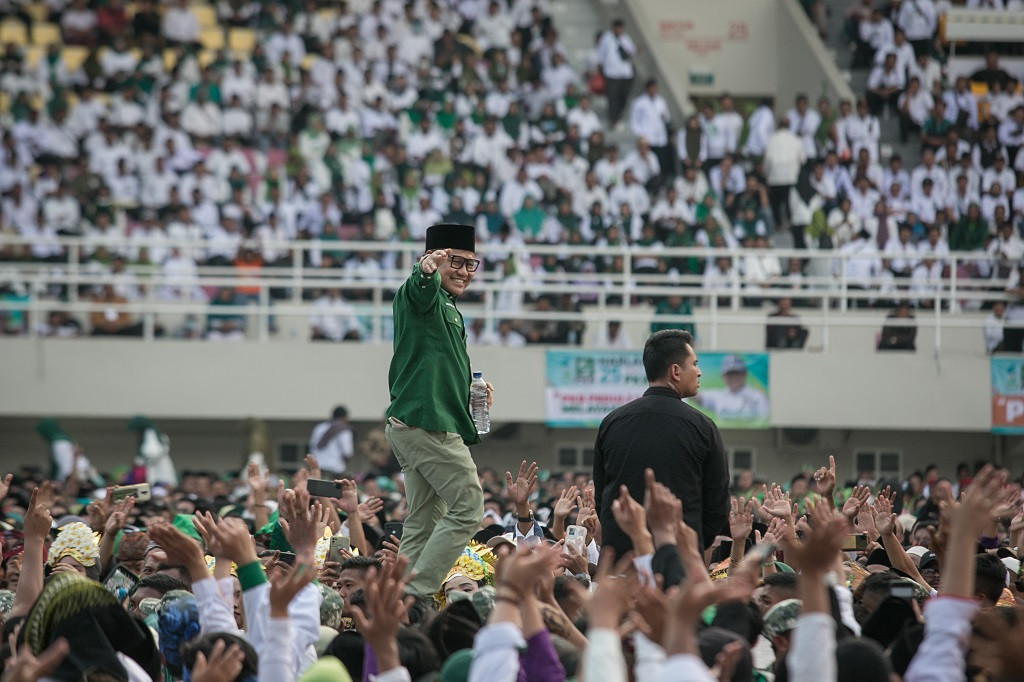Popular Reads
Top Results
Can't find what you're looking for?
View all search resultsPopular Reads
Top Results
Can't find what you're looking for?
View all search resultsNU vote (not) for sale
It is hard to overlook the pragmatism of the political elites in exploiting NU sentiment for their short-term electoral objectives.
Change text size
Gift Premium Articles
to Anyone

We cannot overstate the critical role that Nahdlatul Ulama (NU) will play in the upcoming presidential election. This is not simply because NU represents the majority of Indonesian Muslims, even those who are not card-carrying members.
NU matters electorally, primarily because it is an influential group for voters in East Java, the battleground province where none of the presumptive presidential contenders, Prabowo Subianto, Ganjar Pranowo and Anies Baswedan, has a strong foothold. It is no surprise that NU figures have been listed among the strongest candidates for vice president, they are seen as the ultimate vote-getters.
Anies, for instance, has chosen National Awakening Party (PKB) leader Muhaimin Iskandar, a rational and practical political move that nonetheless caught many by surprise, given that for years the former Jakarta governor has been pandering to Islamic groups whose transnational ideology is largely compatible with NU’s worldview.
Prabowo and Ganjar have considered several NU figures such as Coordinating Political, Legal and Security Affairs Minister Mahfud MD, East Java Governor Khofifah Indar Parawansa and Yenni Wahid, a daughter of former president and NU chairman Abdurrahman “Gus Dur” Wahid, as potential running mates. It is not impossible that next year’s election could be a derby match of NU figures.
It is not unusual for politicians to mobilize racial, religious and nationalist sentiments to garner votes, it is the original sin of identity politics, even though such a strategy is not inherently immoral, especially when identity politics is used to emancipate a group of people who have been structurally, politically or economically marginalized.
On the other hand, it is hard to overlook the pragmatism of the political elites in exploiting the NU sentiment for their short-term electoral objectives. A case in point is the portrayal of State-Owned Enterprises Minister Erick Thohir as an NU member after joining its auxiliary group, Banser. Tourism and Creative Economy Minister Sandiaga Uno has also earned the “NU” label after joining the United Development Party (PPP), which once served as the only political avenue for political Islam, including NU.

This is indeed concerning not only for NU, but for our democracy. For now NU has become the main organization purportedly playing identity politics. With revivalist organizations like the Islam Defenders Front (FPI), Hizbut Tahrir Indonesia and the Salafi groups linked to the 2/12 movement losing ground, NU is now serving as the only political instrument the elites can use to grab power.
NU has won praise not only as the vanguard of moderate Islam but also as a backbone of our democracy. As a civil society group that champions the values of pluralism and progressive religious views, NU is way too important to merely serve as an electoral tool of the political elites.
NU chairman Yahya Cholil Staquf has asserted that NU is a civil society group that operates beyond party politics. This is encouraging, but we need to remind him that statements do not necessarily prove commitment.
Historically, NU has always been part of Indonesian politics, not only at the grassroots but also at the elite level. The question is whether Yahya can resist the temptation of playing politics, given his power as NU’s senior leader.
Soon after Muhaimin declared his vice-presidential bid, Yahya quickly stated that no political candidate could claim to represent NU. Yahya’s brother, Yaqut Cholil Qoumas, who is the religious affairs minister, meanwhile, asked the people not to vote for a “divisive” candidate, a clear reference to Anies, who was accused of using sectarian rhetoric to win the 2017 Jakarta gubernatorial race.
Taken at face value, such remarks are perhaps politically harmless, but it becomes problematic due to the fact that Yaqut is close to Erick, a potential vice-presidential candidate for Prabowo, and that Ganjar has met with the mother of Yahya and Yaqut as part of his political tour.
We are giving the benefit of the doubt that Yahya will protect NU from any form of predatory politics. What is at stake is not only NU’s credibility as a beacon of morality, but also the fate of our democracy.










